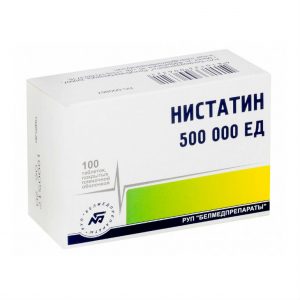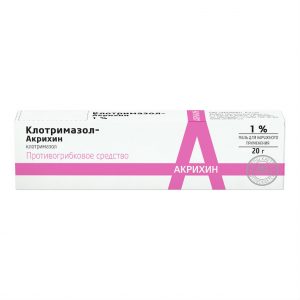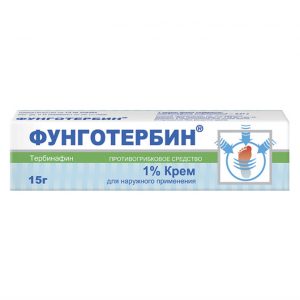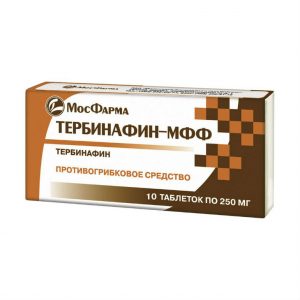Description
Release form
Nail polish: thick, colorless transparent liquid (2.5 ml each in dark glass bottles, the kit includes 30 napkins, 10 special spatulas and 30 disposable nail files in a pack of cardboard, 1 set each).
Pharmacological action of
Pharmacodynamics of
The active ingredient of Exorolfinlac – amorolfine – provides its fungistatic and fungicidal efficacy due to the destruction of the cytoplasmic fungal membrane by disrupting sterol biosynthesis, due to which the level of ergosterol decreases and atypical stereoisomers – steric non-planar sterols are cumulated. Due to the wide spectrum of action, amorolfin is highly active against not only the most common, but also rare fungal pathogens affecting the nail plate: dermatophytes: Microsporum spp., Trichophyton spp., Epidermophyton spp. yeast fungi: Candida spp., Malassezia spp. (Pityrosporum spp.), Cryptococcus spp. mold fungi: Scopulariopsis spp., Alternaria spp., Hendersonula spp. fungi of the family Dematiaceae: Fonsecaea spp., Cladosporium spp., Wangiella spp. dimorphic fungi: Histoplasma spp., Coccidioides spp., Sporothrix spp.
Pharmacokinetics
After applying nail polish to the nail plate and then to the nail bed, amorolfine penetrates almost completely during the first 24 hours. An effective concentration of the substance is maintained at the lesion sites for 7 to 10 days even after the first application. The substance undergoes systemic absorption slightly, its plasma concentration is below the sensitivity limit of the determination methods (<0.5 ng / ml). Indications According to the instructions, Exorolfinlac is recommended for topical treatment of fungal infections of the nail plates caused by yeast, dermatophytes and molds. The drug is also used to prevent fungal infections of the nails. Contraindications pregnancy and lactation children and adolescents under the age of 18 hypersensitivity to amorolfine and other components of the drug. Use during pregnancy and lactation Data on the use of amorolfine during pregnancy and during breastfeeding are limited, and therefore the use of Exorolfinlac during these periods is not recommended. Special instructions When treating with Exorolfinlac, it is necessary: Do not use the nail files used to treat affected nails in order to process healthy nail plates. When working with organic solvents to protect the nails covered with the preparation, wear impervious gloves. Avoid using artificial false nails. Do not apply varnish too often or in violation of the requirements for application, since this can lead to irritation / dryness of the skin around the nail due to the presence of ethanol in the preparation. Take into account that the cleaning cloth contains a flammable substance. Avoid getting the drug in the ears, eyes, mucous membranes, and in case of accidental contact, immediately flush affected surfaces with large amounts of water. In case of systemic / local hypersensitivity reactions, the use of the drug is immediately stopped and consult a doctor, first using the nail polish remover to remove the drug from the nails. In this case, do not apply Exorolfinlack repeatedly. Conditions predisposing to the development of fungal diseases of the nails of the nail, such as diabetes mellitus, impaired peripheral circulation, immunodeficiencies, as well as nail dystrophy or damaged nail plate, psoriasis, other chronic skin diseases require a specialist. When more than 2/3 of the nail plate is destroyed or affected by the fungus, it is also necessary to consult a doctor for prescribing oral preparations for the purpose of conducting complex therapy. Composition of per 1 ml of varnish: active ingredient: amorolfine – 50 mg (as amorolfine hydrochloride – 55.74 mg) auxiliary ingredients: ethyl acetate – 150 mg triacetin – 10.5 mg eudragit RL PO (methacrylic acid copolymer) – 125 mg butyl acetate – 50 mg ethanol – 480 mg. Dosage and administration Exorolfinlac is intended for external application to the affected nail plates of fingers and / or toes. The procedure is performed 1-2 times a week, observing the following recommendations: Before using the drug, with the help of a disposable file in the kit, if possible, remove the affected nail fragments, especially from its surface. The surface of the nail is cleaned and degreased with a special cleaning cloth from the kit (for each subsequent application, repeat the procedure for treating affected nails with a nail file, after which the remaining varnish is removed with a cleaning cloth). The applicator is immersed in a bottle of varnish, then it is carefully removed without erasing the excess of the preparation on the neck of the bottle. An applicator is applied to the entire surface of the affected nail plate with an even layer of varnish, repeating the procedure for each affected nail. Withstand time for about 3 minutes to dry the varnish. The applicator is wiped with a napkin used to clean the nails, avoiding contact with the treated nails. The bottle is tightly closed immediately after the procedure. The used napkin is discarded. It is allowed to apply decorative nail polish over Exorolfinlak, but not earlier than 10 minutes after the procedure. Before re-applying the drug Exorolfinlak, the remaining decorative nail polish must be carefully removed, and then with the help of the supplied files, treat the affected nail plates and remove the remaining nail polish with cleaning wipes. You should wash your hands thoroughly after the end of each treatment procedure, but when applying the drug to the fingernails, you must first wait for the varnish to dry completely. After the varnish is completely dry, you can regularly wash your hands and feet with soap. The course of therapy is long, stopping the use of Exorolfinlac should be after complete regeneration of the nail plate and cure the affected nails. The average duration of a course for fingernails is 6 months, for fingernails – 9-12 months. Since the nail plates grow slowly, The first signs of improvement are noticeable only after 2-3 months of systematic use of the drug. If there are no such signs after 3 months, you need to consult a doctor. Side effects The use of the drug Exorolfinlac causes undesirable reactions in rare cases. Nail damage noted during treatment (destruction of the nail plates, discoloration, and brittle nails) are most likely the result of fungal infections. The frequency of adverse reactions recorded during the use of Exorolfinlac in accordance with the adopted system-organ classification (in accordance with the scale: very often – more than 0.1 often – no more than 0.01, but less than 0.1 infrequently – no more than 0.001, but less than 0.01 rarely – no more than 0.0001, but less than 0.001 extremely rare – less than 0.0001 unclear frequency – it is impossible to quantify adverse reactions based on available data): skin and subcutaneous tissue: rarely – discoloration of the nail plate, damage to the nails, fragility of the nail plate (onychoclasia), fragility of the nails wail plate (onihoreksis) rarely – a burning sensation of the skin unexplained frequency – urticaria, pruritus, erythema, contact dermatitis, blisters immune system: unexplained frequency – systemic hypersensitivity reactions. If any of these side effects are aggravated or other negative reactions are not indicated in the description, you should immediately consult a doctor. Overdose The drug is used exclusively for external use, in which it is not expected to develop systemic signs of an overdose. In case of accidental ingestion of Exorolfinlac, appropriate symptomatic treatment is required. Storage conditions Store in a place protected from light, out of the reach of children, at a temperature of up to 25 ° C. Expiration Once opened, the vial should be used for 6 months. Deystvuyuschee substances Amorolfyn No terms for pharmacies p14f69 sflrd pharmacy leave without prescription Form of Treatment tablets




